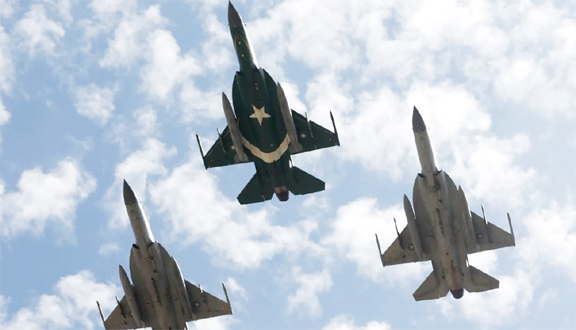DE News Desk :
Pakistan’s Defence Minister confirmed on Wednesday that five Indian fighter jets were shot down in a sharp military retaliation to overnight airstrikes by India on multiple locations inside Pakistani territory.
“At this hour, I can confirm that at least five Indian fighter aircraft have been downed,” said Defence Minister Khawaja Asif in a statement to local media.
He added that Indian forces had withdrawn from several forward posts along the Line of Control (LoC) following heavy retaliatory fire from Pakistan.
According to the Inter-Services Public Relations (ISPR), the media wing of the Pakistan Army, Indian missile strikes killed at least eight civilians, including a child, and injured 35 others. Two people were reported missing.
The strikes, which reportedly created 24 impact points, also destroyed four mosques, damaged several homes, and left a hospital severely impaired.
The missile strikes hit six locations, including Bahawalpur, Sialkot, Shakargarh, and Sheikhupura in Punjab province, as well as Muzaffarabad and Kotli in Pakistan-administered Kashmir.
The ISPR claimed the missiles were launched from within Indian airspace and did not breach Pakistan’s borders.In a televised statement, ISPR Director General Lieutenant General Ahmed Sharif Chaudhry vowed a firm response.
“Let me state clearly: Pakistan will respond to this aggression at a time and place of its choosing. This provocation will not go unanswered,” he declared.Pakistan has suspended its airspace for 48 hours, closed schools across Punjab, and declared a state of emergency in hospitals in affected regions.
President Asif Ali Zardari condemned the strikes, calling them an attack on civilian populations and pledging an unwavering response.
“Indian provocations will be met with full force,” Zardari said, adding that the nation stands firmly behind its armed forces.
Prime Minister Shehbaz Sharif also condemned the Indian action. “This is an act of war. A fitting response is already underway,” he stated.
“The entire nation stands united with our armed forces in defense of Pakistan’s sovereignty.”
The Ministry of Foreign Affairs in Islamabad described the strikes as an “unprovoked and blatant act of aggression,” accusing the Indian Air Force of using standoff weapons to target civilian areas while remaining within its own airspace.
It warned the escalation posed a significant threat to regional stability and civilian air traffic.
“India’s reckless actions have pushed the region dangerously close to a major conflict,” the ministry said, reiterating Pakistan’s right to respond in line with the UN Charter.
Across the border, Indian officials reported that three civilians were killed and several more injured during artillery exchanges with Pakistani forces along the LoC and the International Border.
According to Indian Army sources, the fatalities occurred in Poonch district in Jammu and Kashmir.
“Our forces are responding proportionately to cross-border shelling,” the army said.Wednesday marked the 13th consecutive day of ceasefire violations along the LoC.
India earlier confirmed launching a series of airstrikes targeting what it described as “terrorist training camps” in Pakistan-controlled Kashmir.
The operation, dubbed “Operation Sindoor,” was said to be in response to the April 22 massacre of tourists in Pahalgam, which left 26 dead — including 25 Indians and one Nepali citizen.
Indian Prime Minister Narendra Modi personally oversaw the operation, which the Ministry of Defence described as “focused, measured, and non-escalatory.”
According to the ministry, nine sites linked to militant groups were struck, with no Pakistani military installations targeted.”
India has acted with restraint in the selection of targets and methods of execution,” the statement read.Meanwhile, Pakistani Prime Minister Sharif spoke to UN Secretary-General António Guterres on Monday to raise concerns over India’s “provocative rhetoric and war-mongering.”
Guterres reportedly reiterated the UN’s commitment to regional peace and ongoing diplomatic engagement with both countries.Commercial air travel was also impacted by the crisis.
Indian carrier IndiGo announced disruptions to flights serving airports near the Pakistan border. Airspace closures are expected to affect both domestic and international routes.
With tensions at their highest point in years, regional and global actors continue to call for de-escalation. But as military operations intensify and civilian casualties mount, fears of a wider conflict loom large over South Asia.

